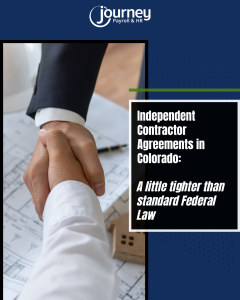Most employers are at least somewhat familiar with the federal rules for independent contractors, don’t control the worker too much, let them invoice you, don’t provide benefits, etc. That’s all well and good… unless you’re in Colorado. Because in Colorado, you can be fully compliant under federal law and still get dinged for misclassification under state law. And the consequences? Let’s just say they can sting more than a surprise tax bill in April.
 Colorado’s Contractor Rules: More Than Just Semantics
Colorado’s Contractor Rules: More Than Just Semantics
Colorado law says that even if you and your contractor agree on their status, that’s not enough. The presumption is that a worker is an employee, and it’s your job as the business owner to prove otherwise.
To do that, you need two things:
- Actual independence in the working relationship, and
- A written agreement that includes very specific legal affirmations.
Miss either one and the Colorado Department of Labor & Employment (CDLE) may determine that your contractor is actually an employee—which can mean back wages, unpaid benefits, and penalties.
A Written Agreement Isn’t Optional—It’s Required
Colorado law (specifically C.R.S. § 8-70-115) spells out that independent contractors must have a written agreement that affirms the following (and ideally more):
- The worker is not required to work exclusively for the hiring party.
- The worker is free to provide similar services to others.
- The worker sets their own hours.
- The worker is paid by the job, not by time.
- The worker provides their own tools, equipment, or materials.
- The worker controls the manner and method of their services.
- The worker incurs their own expenses.
- The worker is not covered by your company’s workers’ comp or unemployment insurance.
- The worker is responsible for their own income taxes.
Some additional affirmations that can strengthen your position:
- The worker maintains a separate business location.
- The worker has business liability insurance.
- The agreement does not include performance reviews.
- The agreement allows for termination by either party without cause.
These aren’t “nice to have” clauses, they are critical to enforceability if you want to avoid reclassification.
Federal vs. Colorado: A Quick Comparison
| Factor | Federal Law (IRS/DOL) | Colorado Law |
| Written Agreement | Helpful but not required | Required with statutory affirmations |
| Presumption | None | Worker is presumed to be an employee |
| Evaluation Criteria | Behavioral, financial, relational | Legal structure plus working reality |
| Enforcement Agencies | IRS, Dept. of Labor | IRS, Dept. of Labor |
So, even if your agreement might satisfy federal law, it can still fall short in Colorado if it doesn’t have the required structure and language.
Bottom Line: Protect Your Business Now
Misclassifying a worker in Colorado could mean:
- Owed back taxes
- Unpaid unemployment contributions
- Retroactive workers’ comp premiums
- Potential legal fees
- A lot of awkward conversations
Don’t Guess……Know
If you’re hiring 1099 contractors in Colorado, now’s the time to make sure your agreements are doing what you think they’re doing.